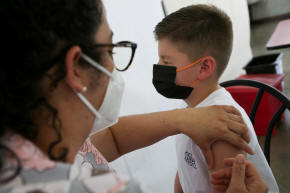Pfizer/BioNTech COVID vaccine slashes pediatric hospitalization risk
-U.S. study
 Send a link to a friend
Send a link to a friend
 [March 31, 2022]
By Michael Erman [March 31, 2022]
By Michael Erman
NEW YORK (Reuters) -Children ages 5 to 11
who received the Pfizer/BioNTech COVID-19 vaccine were 68% less likely
to be hospitalized during the Omicron wave in the United States than
unvaccinated children, according to a study published on Wednesday.
Adolescents aged 12-18 who received two shots of the vaccine were around
40% less likely to be hospitalized with the Omicron variant of the
virus, the study led by scientists from the U.S. Centers for Disease
Control and Prevention (CDC) and Boston Children's Hospital found. It
was published in the New England Journal of Medicine.
The risk of more serious outcomes, including need for mechanical
breathing assistance or death, was nearly 80% lower for those who
received the shots in that age group.
"Infections like COVID and respiratory infections have a range of
severity," said CDC researcher Dr. Manish Patel. "But action against
severe disease can still be maintained."

[to top of second column]
|

Pfizer/BioNTech's new pediatric COVID-19 vaccine vials are seen in
this undated handout photo. Pfizer/Handout via REUTERS
 The study looked at vaccinated and
unvaccinated patients with and without COVID-19 at 31 hospitals in
23 states.
The vaccine performed better against the Delta variant of the
coronavirus, which was circulating last year. Vaccine effectiveness
against hospitalization in adolescents when that variant was
dominant was around 93%, the study found.
The results of the CDC study were better for the younger age group
than a study that New York state researchers published in February.
That study found the vaccine was around 48% effective in keeping
children out of the hospital, with 73% efficacy against
hospitalization among adolescents in January of 2022.
"Most kids that have critical illness were unvaccinated," Patel
said. "And we should be able to prevent that with a simple act of
vaccination."
(Reporting by Michael ErmanEditing by Bill Berkrot)
[© 2022 Thomson Reuters. All rights
reserved.] This material may not be published,
broadcast, rewritten or redistributed.
Thompson Reuters is solely responsible for this content. |